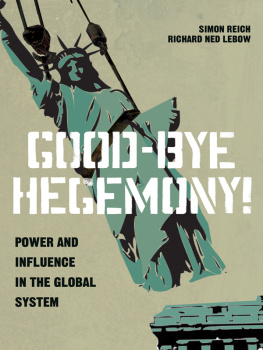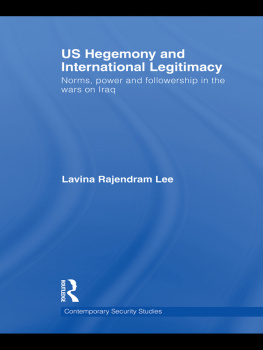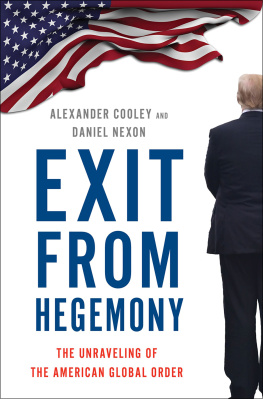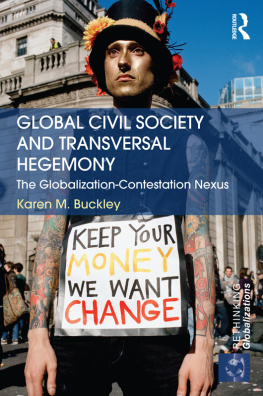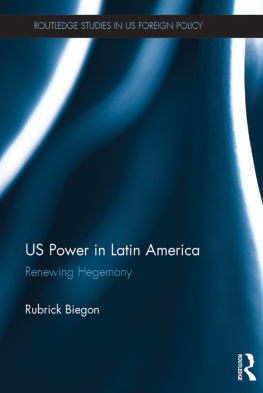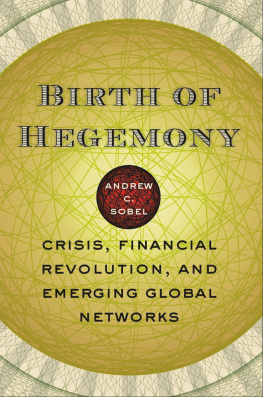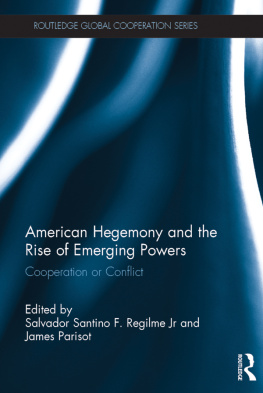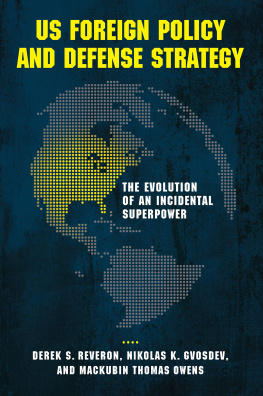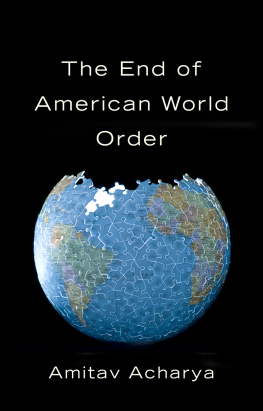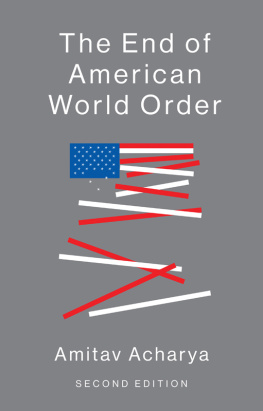
Good-Bye Hegemony!
Good-Bye Hegemony!
POWER AND INFLUENCE IN THE GLOBAL SYSTEM
Simon Reich
Richard Ned Lebow
PRINCETON UNIVERSITYPRESS
PRINCETON AND OXFORD
Copyright 2014 by Princeton University Press
Published by Princeton University Press, 41 William Street, Princeton, New Jersey 08540 In the United Kingdom: Princeton University Press, 6 Oxford Street, Woodstock, Oxfordshire OX20 1TW
press.princeton.edu
All Rights Reserved
Library of Congress Cataloging-in-Publication Data
Reich, Simon.
Good-bye hegemony! : power and influence in the global system / Simon Reich, Richard Ned Lebow.
pages cm
Includes bibliographical references and index.
ISBN 978-0-691-16042-9 (hardcover : alk. paper)ISBN 978-0-691-16043-6 (pbk. : alk. paper) 1. Balance of powerHistory21st century. 2. World politics21st century. 3. International relationsHistory21st century. I. Lebow, Richard Ned. II. Title.
JZ1310.R45 2013
327.11dc23
2013018206
British Library Cataloging-in-Publication Data is available
This book has been composed in Palatino
Printed on acid-free paper.
Printed in the United States of America
1 3 5 7 9 10 8 6 4 2
To the Ballard family and la famiglia Forlatti
With love and gratitude transcending the decades
Contents
List of Tables
Preface
A merican leaders had contradictory goals in the decades following World War II. They wanted to foster democracy and economic development, but were opposed to left-wing parties and governments. They wanted the order they associated with hierarchy and to preserve the United States extraordinary position in 1945 as far and away the worlds most powerful country. Policy makers sometimes made trade-offs among these goals, as they did by consistently supporting right-wing dictatorships over their democratic opponents in the name of anticommunism. More often than not they denied trade-offs, convincing themselves they could pursue all these goals simultaneously.
American academics catered to this illusion by developing the concept of hegemony. It made it appear that hierarchy in the form of American hegemony was beneficial to democracy and development and was welcomed by major actors everywhere outside the Soviet bloc. Americans considered Moscows opposition to US hegemony as opposition to global order and thus a sign of aggressive intentions. A growing bloc of neutrals who also expressed their disquiet, with India as its most vocal spokesmen, were dismissed as misguided, or even as dupes of Moscow. Instead of speaking truth to power, international relations scholars, with few notable exceptions, became spokesmen, therapists, and propagandists on behalf of the burgeoning national security establishment for the assumptions that undergirded American foreign policy.
Almost seventy years later, American realists and liberals continue to defend hegemony in theory and practice. They ignore the evidence that hegemony was only partial and short-lived and that American efforts to maintain order (e.g., in Vietnam, Afghanistan, and Iraq) were a primary source of disorder in the international system. Despite ample evidence to the contrary, they delude themselves into believing that most of the world welcomes American leadership and that its policies invariably engender stability.
We challenge this orthodoxy and offer what we believe is a more plausible and constructive view of Americas role in a posthegemonic world. It recognizes the limitations to American leadership, but seeks to enhance its interests and to reflect its values in the context of a rapidly evolving world. As scholars we engage not only the empirical claims associated with hegemony but its conceptual foundations. The latter are ambiguous, inconsistent, and err in equating material capabilities with power and power with influence. America is unequivocally powerful but only occasionally influential.
Our project has multiple sources of inspiration. Scholars and friends like Hans Morgenthau and Susan Strange influenced our thinking. They retained both the notion that international relations should be transformative and rejected the tendency of theorists to reflect, rather than challenge, the dominant orthodoxy of their societies.
Our paths crossed many years before we became coauthors. It was in the early 1980s, when Simon was a graduate student and Ned a professor at Cornell University. We worked in different areas of the discipline, one in political economy and the other in security, and continued our separate ways even as colleagues at the University of Pittsburgh. Our agendas finally converged as we both shook our heads in amazement at the continuing fixation on hegemony of so many of our US colleagues.
Several dozen oysters washed down by a good Sancerre on the rue Cler led to a commitment to coauthor a book. We received sustained support from our wives, Ariane and Carol, the usual distraction from Simons children (Jamie, Melissa, and Amanda) and helpful feedback from Neds three children and son-in-law (scholars in their own right). We also received professional interest, support, and guidance from Chuck Myers, then executive editor at Princeton University Press, and his successor, Eric Crahan, who brought this book to fruition. We wish Chuck well in his new position.
Simon Reich wishes to thank Karie Gubbins and M. J. Kronfeld, who provided him with research assistance, and Ann Martin for her support and friendship. Guonan Ma, Barry Naughton, and Tom Rawski proved very helpful in tracking down the data on China, for which we are grateful. Simon also acknowledges the financial support of both the Graduate School and the Division of Global Affairs at RutgersNewark, and the School of Politics and International Relations at Australian National University (ANU), where he was a visiting fellow. He particularly thanks Adam Graycar.
In addition to giving lectures on the basis of this work at ANU, Simon presented aspects of this research at the Diplomatic Academy in Vienna; the Air Force University in Montgomery, Alabama; the Centre dtudes et de Recherches Internationales at Sciences Po in Paris; the German Marshall Fund in Washington, D.C.; Kings College Londons Department of War Studies, and the International Studies Association conferences in Edinburgh and San Diego. Simon also wishes to thank Shaun Breslin, Carla Norrlof, andmost notablyBruce Jentleson; they provided valuable comments on all or part of the manuscript.
Simon dedicates this book to the Ballard Family: to Peter, the angel with a dirty face, with deep respect for his love and dedication; and to Ruth for her love, humor, and continuing support.
Ned thanks Simon for bringing the project to his attention and inviting him to be coauthor. He is grateful to the Swedish National Research Council and the University of Lund for awarding him the Olof Palme Professorship and hosting him for the 201112 academic year. This allowed him to work full-time on this book and other projects. He must also thank Mervyn Frost and the War Studies Department at Kings College for a most stimulating postretirement professorship, and colleagues at Pembroke College, University of Cambridge, for electing him a Bye-Fellow.
Ned dedicates this book to Laura Forlatti-Picchio, Zeno Forlatti, and their four daughters, sons-in-law, and grandchildren. In the course of thirty-plus years of friendship Laura and Zeno and their family have become his family, and he and Carol and his children are deeply grateful for their friendship and many kindnesses.
London and Paris, February 2013
Good-Bye Hegemony!
Next page
